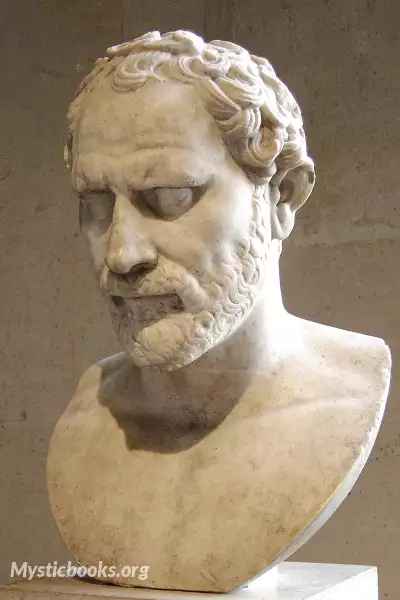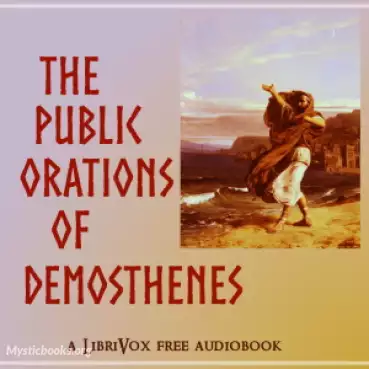
Timeline
Title
Country/Nationality
Demosthenes
Demosthenes was a Greek statesman and orator in ancient Athens. His orations constitute a significant expression of contemporary Athenian intellectual prowess and provide insight into the politics and culture of ancient Greece during the 4th century BC. Demosthenes learned rhetoric by studying the speeches of previous great orators. He delivered his first judicial speeches at the age of 20, in which he successfully argued that he should gain from his guardians what was left of his inheritance. For a time, Demosthenes made his living as a professional speechwriter (logographer) and a lawyer, writing speeches for use in private legal suits.
Demosthenes was born in 384 BC, during the last year of the 98th Olympiad or the first year of the 99th Olympiad. His father—also named Demosthenes—who belonged to the local tribe, Pandionis, and lived in the deme of Paeania in the Athenian countryside, was a wealthy sword-maker. Aeschines, Demosthenes' greatest political rival, maintained that his mother Kleoboule was a Scythian by blood—an allegation disputed by some modern scholars. Demosthenes was orphaned at the age of seven. Although his father provided for him well, his legal guardians, Aphobus, Demophon and Therippides, mishandled his inheritance.
Demosthenes started to learn rhetoric because he wished to take his guardians to court and because he was of "delicate physique" and could not receive gymnastic education, which was customary. In Parallel Lives, Plutarch states that Demosthenes built an underground study where he practised speaking and shaving one half of his head so that he could not go out in public. Plutarch also states that he had "an inarticulate and stammering pronunciation" that he overcame by speaking with pebbles in his mouth and by repeating verses when running or out of breath. He also practised speaking in front of a large mirror.
As soon as Demosthenes came of age in 366 BC, he demanded his guardians render an account of their management. According to Demosthenes, the account revealed the misappropriation of his property. Although his father left an estate of nearly fourteen talents (equivalent to about 220 years of a labourer's income at standard wages, or 11 million dollars in terms of median U.S. annual incomes). Demosthenes asserted his guardians had left nothing "except the house, and fourteen slaves and thirty silver minae" (30 minae = ½ talent). At the age of 20 Demosthenes sued his trustees to recover his patrimony and delivered five orations: three Against Aphobus during 363 and 362 BC and two Against Onetor during 362 and 361 BC. The courts fixed Demosthenes' damages at ten talents. When all the trials came to an end, he only succeeded in retrieving a portion of his inheritance.
According to Pseudo-Plutarch, Demosthenes was married once. The only information about his wife, whose name is unknown, is that she was the daughter of Heliodorus, a prominent citizen. Demosthenes also had a daughter, "the only one who ever called him father", according to Aeschines in a trenchant remark. His daughter died young and unmarried a few days before Philip II's death.
In his speeches, Aeschines uses pederastic relations of Demosthenes as a means to attack him. In the case of Aristion, a youth from Plataea who lived for a long time in Demosthenes' house, Aeschines mocks the "scandalous" and "improper" relation. In another speech, Aeschines brings up the pederastic relation of his opponent with a boy called Cnosion. The slander that Demosthenes' wife also slept with the boy suggests that the relationship was contemporary with his marriage. Aeschines claims that Demosthenes made money out of young rich men, such as Aristarchus, the son of Moschus, whom he allegedly deceived with the pretence that he could make him a great orator. Apparently, while still under Demosthenes' tutelage, Aristarchus killed and mutilated a certain Nicodemus of Aphidna. Aeschines accused Demosthenes of complicity in the murder, pointing out that Nicodemus had once pressed a lawsuit accusing Demosthenes of desertion. He also accused Demosthenes of having been such a bad erastes to Aristarchus so as not even to deserve the name. His crime, according to Aeschines, was to have betrayed his eromenos by pillaging his estate, allegedly pretending to be in love with the youth so as to get his hands on the boy's inheritance. Nevertheless, the story of Demosthenes' relations with Aristarchus is still regarded as more than doubtful, and no other pupil of Demosthenes is known by name.
Books by Demosthenes

The Public Orations of Demosthenes
Demosthenes was a prominent Greek statesman and orator of ancient Athens. His orations constitute the last significant expression of Athenian intellectual prowess and provide a thorough insight into the politics and culture of ancient Greece. The Al...